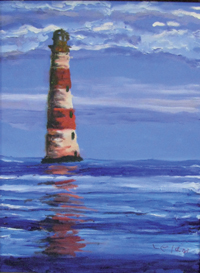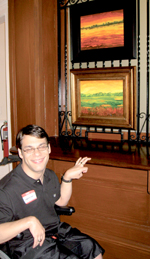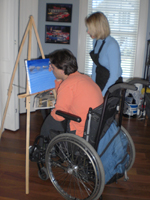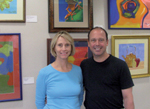|
|
|

|
Seeing the Light
Artists raise funds
for Storm Eye Institute, show that art can transcend challenges
|
by Dawn Brazell
Public Relations
The name of the piece on exhibit at the Wellness Center is Morris
Island Blues.
 Other
than the soothing colors of the piece, there’s not a blue thing about
it. There’s an energy to the depiction of Folly Beach’s Morris Island
Lighthouse that speaks of other things, like hope and courage. A part
of the Art Connects Us Art School’s 4th annual exhibition that runs
through June, the piece has been chosen to be printed on T-shirts and
posters for the 2011 half-marathon and 5K races sponsored by the
non-profit group, Save the Light Inc., that is dedicated to saving the
lighthouse. Other
than the soothing colors of the piece, there’s not a blue thing about
it. There’s an energy to the depiction of Folly Beach’s Morris Island
Lighthouse that speaks of other things, like hope and courage. A part
of the Art Connects Us Art School’s 4th annual exhibition that runs
through June, the piece has been chosen to be printed on T-shirts and
posters for the 2011 half-marathon and 5K races sponsored by the
non-profit group, Save the Light Inc., that is dedicated to saving the
lighthouse.
Artist Leland Wilson likes that.
Leland Wilson's
“Morris Island Blues” is on display at the Wellness Center through June
as part of the Art Connects Us Art School’s 4th annual exhibition.
He and the lighthouse have had a tough battle against life’s
circumstances. Leland, who was born prematurely, has
multi-handicaps including cerebral palsy and optic nerve damage, which
has left him legally blind, able to read an eye chart at a 20/300
level. It hasn’t stopped Leland, 30, though, from pursuing his art
thanks to the help of his teacher Dianne Tennyson, who runs the Art
Connects Us Art School.
His mother, Donna, said that her son was thrilled when he learned his
piece had been chosen. “He was beside himself,” she said. “I told them
‘you don’t want the original picture, do you, because we’re keeping
that.”
 “My philosophy is:
We all would be happier and less stressed if we got just one hug every
day. I give out as many hugs as I can because I point out that
even for a grown man like myself, hugging is still in style—in fact, it
is compulsory.” “My philosophy is:
We all would be happier and less stressed if we got just one hug every
day. I give out as many hugs as I can because I point out that
even for a grown man like myself, hugging is still in style—in fact, it
is compulsory.”
—Leland Wilson,
quoted from his Web site
Art has changed Leland’s life, said his father, M. Edward Wilson, M.D.,
director of the Storm Eye Institute and chair of the Department of
Ophthalmology. He and his wife gave Leland art lessons about five years
ago because he had shown an interest in it in high school.
“Leland has always wanted to be an artist, but until we met Dianne
Tennyson and her Art Connects Us program, there was no way to develop
his talent,” he said. “It is so rare to find artists like Dianne and
Eric who are dedicated, patient and caring towards children and those
who are disabled or who are grieving.”
Tennyson, a registered art therapist, runs the program with her
husband, Eric Vincent, who also is a working artist. She said they have
about 60 students of all ages, with whom they love to share their
passion for art. It’s more than just art to them, she said. It’s about
empowering their students and helping them to find their voices. The
exhibit is the first time many of them have been part of a show, and
they have been thrilled.
 Dianne Tennyson
works with Leland Wilson. Though Tennyson assists Wilson, he does the
actual painting. Dianne Tennyson
works with Leland Wilson. Though Tennyson assists Wilson, he does the
actual painting.
“When I’m doing art therapy, it’s not just about aesthetics. We’re
looking for metaphors,” she said of her philosophy in using art for
self-exploration. “It’s all therapy. The art connects us with ourselves
and with each other.”
What Leland’s parents have noticed in their son is a new sense of joy
and fulfillment. Donna said her son and Tennyson talk the whole time
she’s there assisting him with painting. Though she helps him get set
up, he does all the painting himself. Donna said they’ve enjoyed
watching the progression in his work, and he’s gotten to the point he
has his own Web site: http://lelandwilson.info/.
Leland’s father will take pictures of landscapes and Leland picks what
he wants to paint. His parents said their advice to others with
disabled family members is to get them to keep trying new things.
“You don’t know what they can or can’t do until you try it,” said
Donna. “It makes him feel great that he’s doing well.”
His father agreed that Leland’s self-confidence has blossomed.
“There is now a reason for his friends, family members, and co-workers
at Lowe’s in Mount Pleasant to compliment him,” said Wilson. “For a
person who cannot excel in academics or athletics, the Art Connects Us
experience has been life changing for him, and for Donna and me as
well—actually for the whole family.”
A portion of the proceeds from the art show supports the Storm Eye
SIGHT Free Clinics, and the show helps bring awareness to the clinics’
mission, said Wilson. The clinics, which are held in various locations
from the Storm Eye Institute to churches and homeless shelters, are
organized by MUSC students and residents to provide free, complete eye
exams and treatment to the less fortunate throughout the Lowcountry.
“Our doctors and students have logged in over 4,000 hours of community
service helping the poor in Charleston get access to free eye care,”
said Wilson. “Many people with potentially blinding conditions like
glaucoma and diabetic eye disease have been found early enough to save
sight.”
 Dianne Tennyson and
Eric Vincent stand in front of their students' work. Dianne Tennyson and
Eric Vincent stand in front of their students' work.
Wilson said the connection with the Art Connects Us Art School is a
great partnership for the Storm Eye Institute.
“Art, art therapy, art appreciation, the beauty of the visual
world—these all tie in with the Storm Eye mission of preserving sight
and helping people see the world in all of its glory. Our new tag line
is: ‘Storm Eye Institute—Helping You See the World.’”
For more information on the Storm Eye Institute’s SIGHT Clinics, visit http://alturl.com/ijo5.
For More Info
On the Art Connects Us Art School, visit http://www.artconnects.us.
On Leland’s art work, visit http://lelandwilson.info.
Friday, June 18,
2010
|
|
|



 Other
than the soothing colors of the piece, there’s not a blue thing about
it. There’s an energy to the depiction of Folly Beach’s Morris Island
Lighthouse that speaks of other things, like hope and courage. A part
of the Art Connects Us Art School’s 4th annual exhibition that runs
through June, the piece has been chosen to be printed on T-shirts and
posters for the 2011 half-marathon and 5K races sponsored by the
non-profit group, Save the Light Inc., that is dedicated to saving the
lighthouse.
Other
than the soothing colors of the piece, there’s not a blue thing about
it. There’s an energy to the depiction of Folly Beach’s Morris Island
Lighthouse that speaks of other things, like hope and courage. A part
of the Art Connects Us Art School’s 4th annual exhibition that runs
through June, the piece has been chosen to be printed on T-shirts and
posters for the 2011 half-marathon and 5K races sponsored by the
non-profit group, Save the Light Inc., that is dedicated to saving the
lighthouse. “My philosophy is:
We all would be happier and less stressed if we got just one hug every
day. I give out as many hugs as I can because I point out that
even for a grown man like myself, hugging is still in style—in fact, it
is compulsory.”
“My philosophy is:
We all would be happier and less stressed if we got just one hug every
day. I give out as many hugs as I can because I point out that
even for a grown man like myself, hugging is still in style—in fact, it
is compulsory.”
